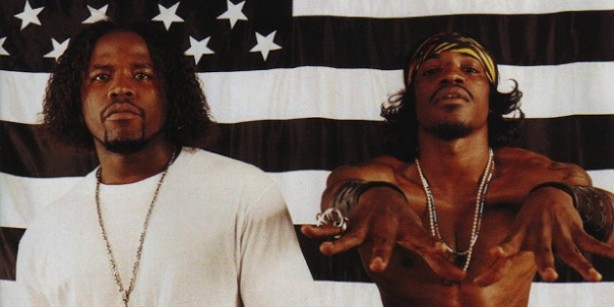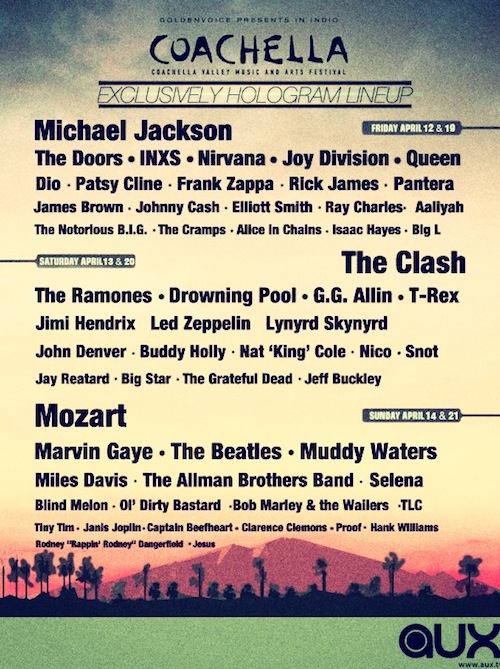 Music
Music
Summer music festivals are all the same thanks to Coachella
by Ryan McNutt
April 11, 2014
This weekend, tens of thousands of sun-seeking music lovers will descend upon the small town of Indio, California for the first weekend of the Coachella Music and Arts Festival—the unofficial kickoff of the summer music festival season.
I wish I were there. Even though I’m at the age when standing shoulder-to-shoulder, sweat-to-sweat with a massive crowd of strangers is starting to seem less and less ideal as a concert experience, I’ve always had a thing for Coachella. I’ve attended the festival twice (2009 and 2012) and it’s simply one of the prettiest, coolest settings one could imagine for seeing dozens of your favourite bands. It hits my personal sweet spot in between corporate (well-organized, comfortable) and hippie (free-flowing, exploratory). The heat is a bit unbearable — I can claim to have survived the hottest Coachella ever, with temperatures hitting 42 Celsius — but the trade off is that the odds of your being rained on are slim-to-none.
But, really, my sentimental streak owes most of its genesis to the years before I actually attended Coachella. The festival’s lineups in the early 2000s, as it began to rise in popularity, crossed over perfectly with the music I was discovering in my college years: new upstarts, reunited alt-rock stalwarts, and everything in between. When you’ve grown up in a peripheral music market like Halifax—where bands only come if a) they feel a Canadian obligation to do so, b) were big a decade ago, or c) just really want to come and probably will take a loss to do so—the idea of Coachella, of making a pilgrimage to the desert in the name of music, was incredibly powerful. That’s why my friends and I pored over the lineup year after year, waiting for the time we’d be free from school obligations and could afford the trip. (What can I say, we were the responsible types.)
At that time, Coachella was the North American single-venue outdoor music festival, the first to successfully and sustainably bring that model across the Atlantic from Europe and make it work in the New World. Today, it’s still among the largest and highest profile of such festivals, but it’s been joined by dozens of others: from Bonnaroo and the now-stationary Lollapalooza in the States to Osheaga and Pemberton (returning for the first time since 2008) in Canada.
Coachella’s still first, though—in both legacy and the calendar year. This weekend will be festival-goers’ first chance to spend a musical weekend in the sun, their first opportunity to soak in the sounds of the year’s biggest bands…
…and the first of 4,584 opportunities this year to see Outkast.
Okay, I’m exaggerating a little bit: at the moment, Outkast are only scheduled to play about 20 or so music festivals in North America, Europe, and Japan this year, though that number is expected to approach 40 by the time their reunion tour winds to a close.
But Andre 3000 and Big Boi are only playing festivals, and they’re headlining most of the world’s biggest, high-profile ones. What once seemed like a buzz of anticipation as rumours swirled—“are Outkast REALLY reuniting?”—now feels like a predictable, repetitive drone of announcements. At this point, I’m frankly surprised when Outkast aren’t announced as a festival’s headliner.
They’re not the only name popping up time and time again. The festival circuit offers attractive opportunities for bands big and small. For large, headlining acts, the paydays are significant — seven figures, in many cases. For smaller bands with smaller payouts, there’s prestige in playing under a festival’s brand and the chance to reach new audiences who like similar types of music.
To get a sense of just how common this festival crossover is, I crunched the lineup numbers from eight of the largest, most high-profile North American outdoor festivals who’ve announced lineups so far this year: Coachella (Indio, CA), Sasquatch (George, WA), Governors Ball (NYC), Bonnaroo (Manchester, Tenn), Osheaga (Montreal), Lollapalooza (Chicago), Outside Lands (San Francisco), and Pemberton (BC). (I’m distinguishing these festivals from the multi-day, multi-venue fests like Ottawa Bluesfest or NXNE, which also have lineup crossover but are very different beasts.)
In total, there are nearly 100 different bands currently booked to play at least two of these eight festivals, with 20 bands signed up to play four or more. Outkast, obviously, is among the festival-iest bands, headlining five of the eight. They’re joined in the five-timers club by Chvrches, Chromeo, Cut Copy, Foster the People, and Skrillex. Other notable artists who are playing four fests include the Arctic Monkeys, Broken Bells, Disclosure, and Haim.
This trend—the same names appearing across the festival circuit—isn’t unique this year by any stretch of the imagination. But Outkast’s role in it is a bit of a new twist. While there’s always some headliner crossover, this is the first case I can recall where a high-profile tour (a reunion, no less) has been organized entirely around headlining major music festivals, and the festivals lining up to book it. Obviously, for festivals like Coachella and Lollapalooza that sell out every year, there’s no risk and plenty of reward for having Outkast on the lineup. But will Outkast’s omnipresence hurt smaller-profile festivals who’ve booked the duo, like Forecastle in Kentucky, Hangout in Alabama, or Firefly in Delaware? Will their presence at Osheaga hurt sales at, say, Drake’s OVO fest in Toronto that same weekend?
Alongside the Outkast question, there was another development in the festival circuit this year that some might see as a canary-in-the-coalmine moment: Washington State’s Sasquatch! Music Festival, which takes place on the Memorial Day weekend, cancelled a planned second festival on the July 4 weekend that was to be headlined by Soundgarden, Kraftwerk, and New Order. Live Nation Seattle President Jeff Trisler wrote, simply, that “the second weekend was not embraced,” suggesting ticket sales were sluggish.
Sasquatch’s failure to launch a second weekend might beg the question: have we hit “peak festival”?
Probably not.

AUX’s all-hologram Coachella lineup failed to take off in 2013.
While the Outkast question will have to play itself out through the year, the Sasquatch situation speaks more to one market’s capacity to handle two similar festivals rather than speaking to the festival circuit as a whole. By the numbers, live music is a booming business: $4.8 billion in gross ticket sales worldwide last year, a new record, and a massive leap from the $1.5 billion that number sat at in 1999.
Music festivals aren’t the only story behind that growth—never underestimate the power of the boomer nostalgia market—but they’re a key part of it. America’s “big three” rake in big bucks: $47.3 million for Coachella, $30 million for Bonnaroo and $22.5 million for Lollapalooza in 2012. While not all festivals succeed, the ability for a festival like Montreal’s Osheaga to grow from a small, two-day affair to a three-day, 45,000-person-per-day extravaganza with a lineup rivaling the biggest American fest seems telling.
Like with all live music, market-to-market conditions will vary, and geography and scheduling are huge factors —too many festivals, too close together causes problems no matter who’s at the top of the bill. And, certainly, there’s an open question about how many new festivals the circuit could stand to bear. But at the moment, North American music fans still seem to be smitten with the festival model.
It seems hardly coincidental that the rise of the music festival occurred alongside the music’s transition from physical to digital. I’m not unique in noting that the posters for today’s biggest outdoor fests look like iTunes playlists, or an Rdio/Songza station. They’re the perfect venue for the massive, passive consumption generation. My anecdotal experience at these festivals is that while these festivals attract their share of schedule-conscious music geeks, many younger listeners go with a few bands they’re dying to see but, mostly, are just eager to take everything in and enjoy the experience with friends.
That’s why Outkast’s ubiquity probably isn’t worth that much worry: they’re only part of the package. (And besides, the number of people who are going to attend multiple festivals this year is a small, elite group.) In the 21st century, music is about lifestyle, and nothing fuses music and lifestyle quite like a summer weekend with all your iPod’s favourite bands.





